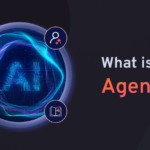
Introduction to Agentic AI
Artificial Intelligence (AI) has rapidly evolved from simple rule-based systems to powerful models that can understand, predict, and interact with humans. The next step in this evolution is Agentic AI. But what is Agentic AI, and why is it being called the future of autonomous intelligence?
Agentic AI refers to AI systems designed to act as autonomous agents, capable of decision-making, goal-setting, and adaptive problem-solving with minimal human intervention. Unlike traditional AI, which often requires direct commands and constant oversight, Agentic AI is self-directed and context-aware.
In this beginner’s guide, we’ll explore the meaning of Agentic AI, how it works, its applications, and its potential to reshape industries and society.
Defining Agentic AI: The Core Concept
The Meaning of “Agentic” in AI
The word agentic comes from “agent,” meaning an entity that can act independently to achieve goals. In AI, agentic systems are not just tools—they’re doers. They can make decisions, adapt to changing environments, and learn from outcomes, much like humans.
Difference Between Agentic AI and Traditional AI
- Traditional AI: Rule-based, task-specific, requires step-by-step programming.
- Agentic AI: Adaptive, flexible, capable of setting sub-goals and achieving outcomes without constant instructions.
For example, a traditional chatbot answers questions based on pre-programmed rules, while an agentic AI chatbot might plan tasks, remember context, and proactively assist users without being explicitly told what to do.
Key Features of Agentic AI
Autonomy and Self-Directed Learning
Agentic AI systems are designed to act on their own, analyzing situations, making decisions, and learning from mistakes without constant human input.
Goal-Oriented Behavior
Unlike basic AI, which just executes commands, Agentic AI is driven by objectives. It can break down large goals into smaller tasks and complete them independently.
Human-Like Decision-Making
Agentic AI uses reasoning models that mimic human thought processes. It can weigh pros and cons, consider multiple outcomes, and adapt strategies to optimize results.
How Does Agentic Work?
AI Agents and Multi-Agent Systems
Agentic AI relies on AI agents—independent software entities that perceive their environment and act to achieve objectives. In multi-agent systems, multiple AI agents collaborate or compete, improving adaptability.
Reinforcement Learning and Feedback Loops
This AI learns through trial and error, similar to how humans learn new skills. Reinforcement learning allows it to improve performance based on feedback loops.
Integration with Large Language Models (LLMs)
Modern Agentic AI often combines LLMs like GPT-5 with agentic frameworks. This integration enables reasoning, memory, and planning, making AI more powerful and autonomous.
Applications of Agentic AI in the Real World
Business and Enterprise Solutions
Companies are adopting Agentic AI to automate workflows, customer service, and decision-making. It helps reduce operational costs and improves efficiency.
Healthcare and Medical Assistance
In healthcare, Agentic AI can monitor patients, suggest treatments, and manage medical data, assisting doctors in making faster, more accurate decisions.
Education and Personalized Learning
Agentic AI enables personalized tutoring systems that adapt to students’ learning styles, making education more effective and engaging.
Robotics and Automation
From self-driving cars to factory robots, Agentic AI powers machines that can act autonomously in dynamic environments.
Benefits
Increased Efficiency and Productivity
Businesses can automate repetitive tasks, allowing humans to focus on higher-level problem-solving.
Better Human-AI Collaboration
Agentic AI can act as a co-pilot for professionals, offering recommendations and handling routine operations.
Adaptive Problem-Solving
Unlike rigid AI, Agentic AI adapts to new challenges, making it valuable in unpredictable environments.
Challenges and Limitations
Ethical and Social Concerns
Autonomous AI raises concerns about accountability, transparency, and bias in decision-making.
Risk of Over-Autonomy
Too much independence may lead to unpredictable outcomes. For example, an AI agent optimizing for efficiency might overlook human values like empathy or fairness.
Technical Limitations
Despite rapid progress, Agentic AI still struggles with long-term planning, memory retention, and complex reasoning.
The Future of Agentic AI
Toward More Autonomous Systems
Future AI will become more proactive, context-aware, and capable of operating in multi-agent ecosystems, where multiple AI systems collaborate seamlessly.
Human-Centered AI Development
To ensure safe adoption, developers must prioritize ethical frameworks, transparency, and human oversight in agentic systems.
FAQs on Agentic AI
1. What is this new form of AI in simple terms?
It’s a type of artificial intelligence designed to operate more like an autonomous agent rather than just a tool. Instead of waiting for constant instructions, it can make its own choices, set small goals, and work toward completing tasks independently. In other words, it behaves more like a “digital assistant” with initiative, rather than a passive program.
2. How is it different from ChatGPT or traditional systems?
Conventional chatbots, like ChatGPT, respond only when a user prompts them. They don’t act on their own. By contrast, these intelligent agents can plan ahead, break down complex goals into smaller steps, and even take proactive action without waiting for input. They go beyond conversation and move toward problem-solving and task execution.
3. Where is this technology being used today?
It already plays a role in several fields:
- Healthcare: Assisting doctors with patient monitoring and treatment planning.
- Business: Automating customer service, scheduling, and data analysis.
- Education: Creating personalized learning paths for students.
- Robotics: Powering machines that adapt to changing environments.
- Digital Assistants: Offering smart support that remembers context and acts on behalf of the user.
4. What are the risks involved?
While promising, there are challenges. One major issue is ethics—how do we ensure that these systems make fair and transparent choices? Another risk is bias, since AI often learns from imperfect data. Finally, if these systems are given too much autonomy, they might behave in ways that aren’t aligned with human values or expectations. That’s why careful design and oversight are essential.
5. Will this kind of AI replace human jobs?
It’s more accurate to say that it will transform jobs rather than replace them entirely. Repetitive and routine work may be automated, but new roles will also emerge—such as supervising, training, and collaborating with these intelligent agents. The future of work will likely involve humans and AI working side by side, where people focus on creativity, strategy, and emotional intelligence, and machines handle the repetitive workload.
6. What does the future look like?
The future is heading toward human-centered, collaborative systems. Instead of replacing people, the aim is to build tools that support and amplify human decision-making. We may see advances in personalized medicine, smarter workplaces, and adaptive learning environments, where these agents help humans achieve goals faster and more efficiently while remaining under ethical and transparent frameworks.
Conclusion
Agentic AI represents the next frontier in artificial intelligence, bridging the gap between tool-like AI and autonomous, decision-making systems. It promises to transform industries, enhance productivity, and foster new levels of human-AI collaboration.
However, as with any powerful technology, Agentic AI must be developed responsibly, ensuring that autonomy does not compromise ethical standards or human oversight.
The question “What is Agentic AI?” is more than a definition—it’s the beginning of understanding a technology that could reshape how we live, work, and interact with machines.








